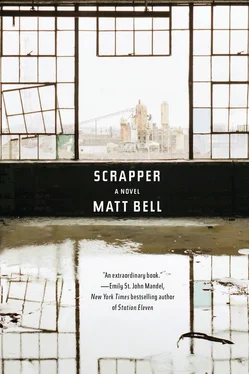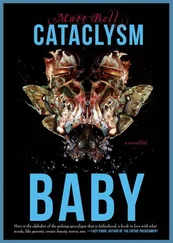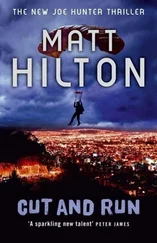The killer was not afraid even during the lengthening nights in the dark of his house, where in those endless hours he lay unsleeping, listening to the charged noise of the street outside his house, listening to the steady clock of his heart while he thought about the spot blocks away where he had killed, where these assholes had made him kill.
Even now, deep in the aftermath, the killer is what the killer was. Surely this has not changed.
Because surely the killer was not afraid.
Surely the killer was not afraid then or ever again.
Surely the killer was not, is not, will not ever be made afraid.
THE PLANT BECKONED AGAIN. A year later and it was still merely scheduled for destruction, hunkered in all its crumbling glory upon the famous avenue. One January afternoon Kelly drove his truck around the front of the buildings first, then into the back alleys, parking along the frozen and rutted mud of the broken roads. He walked across the rubbled yard and into the vast vacancy of the plant, moving through rooms whose shapes loomed differently than what he’d imagined, with ceilings that climbed and swelled or else sagged and fell, with floors cracking and curving away from the level. In other places the reinforced concrete held, looked ready to last another hundred years, and in the interior there were places where no sunlight penetrated and in those dark halls he used his headlamp to peer through piled debris, followed a patina of mold and rust through doorways without doors, the wood long ago rotted, the hinges pocketed. But what was on the other side of any wall was never so different than where he’d come from: a similar kind of cold, better lit or more dark, scavenged or else cluttered with trash, the unmaintained grandeur of open space, everything useful carried away.
Inside the plant he followed the sun’s dappling path, the hours of the day clocked by its transit. It took longer to cross the building in this slow fashion but it was something to do with his body, its newly inexhaustible muscles. As he walked his cell phone rang and voicemail notifications beeped and though he rarely listened to the messages he never deleted them. He let messages pile into his inbox, let voices remain upon his device, caught between satellites in the sky and servers buried in the coolness of the earth. He was well acquainted with how anything might happen. If he wasn’t careful he could lose the people under his care and he feared then he would forget them so fast. This was the cruelty of the linear life, its adaptations: not that you would move on but that the moving on would obscure the past, bury it deep.
Once he’d thought he would never forget the sound of anyone he loved but now he couldn’t remember his grandparents, his mother, his childhood friends. The southern woman was gone only a year and it was as if he had never known her voice.
He could see her boy’s face but could he hear her boy’s speech?
Such a quiet son. So little conversation between them, even at the end when they were always together. More and more all he could remember was his error. All the good destroyed by what he’d done wrong. How he’d stood beside the boy’s bed in the night, how after he’d undressed he had thought he had not been naked but instead dressed in father , as he believed now his father had dressed in his own father’s skin, a trick of black magic for the blackest hours.
When he closed his eyes he could see the southern woman and her boy speaking but he could not hear their voices, their images keeping company among all the other silent faces, all motion, no noise. People he’d loved, fading toward the abstract. There were grids buried beneath the earth and floating above the sky and threaded up the bellies of skyscrapers and from them he would delete nothing. The machines would hoard it all. He didn’t love the modern world but he loved this. If the girl with the limp died tomorrow then he would listen again to her last messages because to keep her alive in memory would be to keep her alive. Because one day there would be no one living who remembered the form of your face or the sound of your voice and on that day it would be as if you had never existed. This was the final death of the unremarkable. No record, no remembrance, no one to carry your speech and your image forward into the future. It would happen to the memory of others because you couldn’t always be vigilant against it. You would not know when it happened to you.
He arrived at the location of the fire not from the outside but from within, from above. It took hours but he knew the general direction through the plant, climbed the floors as he walked until he emerged onto the roof at the edge of the building. The fire was a year old but he thought he could smell the blackened earth somewhere below him, beneath the snow, the bent steel moved aside for the extraction of the bodies. He remembered: How the fireball unfurled as every alight mote of dust lit the next, the distance of air so slim and the fire traveling easy across the gap. How he’d watched the fire engulf the building, the company of men. How he’d put his back to the fire and fled. How as he had he’d imagined the better man who might have stayed, the brave man who might have called for help, who might have heard the voice of the girl with the limp months earlier, when he’d needed it most.
How different this past year could have been.
He might be dead, consumed in the secondary blast bursting after he was already far enough for safety.
He might be in prison and then there would be no girl with the limp for him to know.
The boy would not have been found, at least not by him.
Memory didn’t require remembering to exist. Memory could wait dormant, metastasizing in silence. What he had forgotten might dismantle or appropriate what surrounded it. A mass of loaded neurons fired across gray matter, set off a squelch of wet distortion and biofeedback until there appeared these nameless men lost in the fire, lost as from a safe distance Kelly had stared helplessly into the scorched place of their anguish, their screaming and flailing.
Next came the boy, lost already, who was always to him the boy he became after his captivity, never again the same boy he had been before. It was an agreed-upon fiction that he could be made so again. This was the creed of parents, teachers, therapists, that there was a previous state the boy could be returned to. As if a boy were a fixed quantity. As if the quality of a boy were not a thing in flux.
Then the southern woman, then her child, her own boy, their names he couldn’t bear to speak.
How the nightmare of time was that time was not linear but simultaneous.
How everything that had ever happened to him or from him was still happening, even if he couldn’t always remember the cause. Even if he wouldn’t always admit what he remembered.
How what he’d done meant that he was still his father’s son. How he had become the man the father had been to him, that he thought the grandfather had been to the father.
Their inheritance: Once a killer, always a killer. Once a victim, always a victim.
And could the good man be made to last as long.
Now the fading twilight of the midwestern winter: the site of the fire lay below but whatever he thought he saw wasn’t lit by anything but memory. He had wanted to finish climbing the plant during the day but when he looked around him all he surveyed was the deepening gray of the zone, stretching as far as he could see. The streetlights extinguished, the roads untrafficked for long stretches, each set of headlights a mere wrinkling of the dark. In all directions he saw fewer windows lit than the architects and city planners had intended, than the first citizens of these blocks had hoped.
Читать дальше












